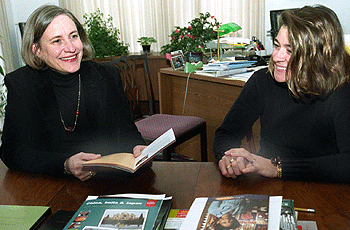Washington University sends more than 500 students to study abroad at 50 different worldwide locations each year. If you think planning an itinerary and packing bags for a semester in London would be tough, try coordinating all of those trips.
That’s where Priscilla Stone comes in.

Stone, Ph.D., is director of Overseas and Undergraduate Programs for International and Area Studies in Arts & Sciences. In addition to her duties organizing study abroad programs for so many students, she also runs the undergraduate major in International and Area Studies and is an adjunct associate professor of sociocultural anthropology in Arts & Sciences.
Educated as an anthropologist, Stone long has had a passion for travel, having done her dissertation work in Nigeria. Turns out, that passion is shared by many students, as well.
“I think students realize we are living in a globalized world, and familiarity with other cultures, languages and systems of government will be an integral part of their lives and their careers,” Stone says. “Getting a head start on that by studying abroad during the undergraduate years seems very compelling to many students. It can be just an amazing experience for students. We talk often about it being a life-changing experience, in fact.”
Her department is undergoing a self-study, revealing trends in student travel abroad. “It’s interesting to find out that more and more of the students going abroad are social science majors,” Stone says. “The old model was that language majors always went abroad. And they still are. But the biggest single major we send abroad today is psychology majors going to Australia and the United Kingdom, primarily. It’s very interesting to watch those trends develop.”
Stone credits her staff with helping to make the growth in international studies possible.
“About 10 years ago, the University acknowledged the importance of an experience abroad as part of an undergraduate education,” says Kathy Steiner-Lang, director of the Office for International Students and Scholars.
“Priscilla has worked hard to develop such opportunities for Arts & Sciences undergraduates,” Steiner-Lang continues. “The number of students studying abroad has greatly increased under her leadership, which has brought a broader international perspective to the campus.”

After earning a doctoral degree in anthropology from the University of Arizona in 1988, Stone and her husband, Glenn Stone, Ph.D., professor of sociocultural anthropology and environmental studies in Arts & Sciences, moved to New York, where Priscilla accepted a position as director of the Africa program with the Social Science Research Council.
The couple moved to St. Louis in 1995, and Stone started as visiting professor of anthropology. Stone is an economic and ecological anthropologist whose primary focus is African agrarian systems. She is interested in agricultural labor and its organization within households and within communities, with a special focus on division of labor by gender.
While at the University, she has done field research in Ethiopia and has studied the effects of globalization on local economies. Her most recent article, published this year in a special issue of the Journal of Development Studies, is titled “Moving in Place: Drought and Poverty Dynamics in South Wollo, Ethiopia.”
After working for one year as a visiting professor, Stone was hired as coordinator of the African studies program in African and African American Studies in Arts & Sciences. While doing that, she began working part-time in International Studies, and that eventually grew into a full-time position.
Students are ‘a joy’
Stone enjoys her job, helping students and faculty members understand the study abroad programs the University has to offer.
|
Priscilla Stone Title: Director of Overseas and Undergraduate Programs for International and Area Studies in Arts & Sciences Family: Husband Glenn Stone, Ph.D., professor of sociocultural anthropology and environmental studies in Arts & Sciences, and children Abigail, a freshman at Columbia University, and Jordan, a senior at John Burroughs High School in St. Louis Hobby: Working on her home and garden |
“Working with students is such a joy,” she says. “We have such great students here. I see them as they first walk in the door as freshmen with all this curiosity and intelligence. Then I get to work with them for four years as they travel abroad, pick a major or apply for a Fulbright scholarship. Watching them mature and grow into their own interests is very gratifying, and I think this field of bringing the world to them is quite rewarding.”
She also enjoys running the undergraduate major in International and Area Studies, an interdisciplinary major that allows students to develop a broad understanding of the world and explore the diversity and richness of other cultures. The major offers several tracks for in-depth exploration of key international issues and world areas.
“Priscilla has been behind many of the impressive developments we have witnessed over the past few years in Overseas Studies and the International and Area Studies major,” says James V. Wertsch, Ph.D., the Marshall S. Snow Professor in Arts & Sciences, director of International and Area Studies and director of the McDonnell International Scholars Academy. “Both of these programs have experienced tremendous growth, much of which would not have happened without Priscilla’s intelligence, foresight and strong leadership. Many students have benefited from her teaching, and others have benefited from the programmatic innovations she has created. We are lucky to have her in a position of leadership. She is a major reason for our success in international programs at the University.”
Stone attributes growth in the undergraduate major to students’ desire to be part of the global world.
“With the place of America now on the world stage, students are very aware of our connection to the rest of the world,” Stone says. “They are thinking about the issues of the day. They want a context to be able to understand things like the war in Iraq.”
The desire to travel forms a common thread among students in the major, Stone says.
“Students who major in international studies are very passionate to be abroad,” she says. “After graduation, many will join the Peace Corps, travel on a Fulbright scholarship or teach English abroad. Many of them are looking for immediate opportunities to live abroad while they are not tied down by family obligations.”
Stone appreciates not only the opportunity to work with students, but also the opportunities provided by the University community.
“I think Washington University is a great place to work,” she says. “My own path demonstrates that in many ways. I came here on a visiting appointment. Through persistence and enthusiasm, I was able to work on important projects. If you have ideas, this setting is a great place to make them happen. It’s a place where you are rewarded for being entrepreneurial, and the resources and support are available to allow you to do things you don’t hear about so much at other institutions. There is an openness and flexibility here that I really appreciate.”
But it is the students that inspire her most. Throughout more than a decade on campus, Stone has reveled in their motivation. “That makes it so much easier when you don’t have to battle against apathy,” she says. “These kids are highly motivated to succeed.”